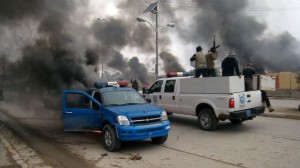Special to WorldTribune.com
BAGHDAD — Two years after the withdrawal of the U.S. military, Iraq stands on the verge of civil war.
The Iraq Army has been ordered to battle Sunni fighters in areas that resisted central government control. Officials said the Army focus has been Anbar, the largest province and along the border with Iraq and Jordan.

“We entered Fallujah with heavy clashes,” Maj. Gen. Fadhel Al Barwari, commander of the Army’s special forces, said.
Officials said Fallujah, a key city in Anbar, has been taken over by Al Qaida militias. They cited the Islamic State of Iraq and the Levant, said to be in control of Fallujah as well as most of the provincial capital of Ramadi.
“The walls of the city [Fallujah] are in the hands of the police force, but the people of Fallujah are the prisoners of ISIL,” Anbar police chief Brig. Gen. Hadi Razeji said.
The U.S.-equipped Army has been struggling to recruit manpower for operations in Anbar. Officials said the Army recruited Sunni tribes, particularly those linked to the U.S.-founded Sahwa auxiliary force.
The Sunnis have rejected the authority of the Shi’ite-dominated
government in Baghdad. Sunni officers in the army have deserted to fight
government-sponsored units and attack police stations and prisons. In two
days of fighting, nearly 200 people have been killed.
“The Interior Ministry calls for all officers and policemen working in
Anbar province who have left their duties to return immediately and perform
their patriotic duty in confronting the terrorist attack,” the Interior
Ministry said.
Sunni politicians have joined the growing revolt against Baghdad. On
Dec. 30, 44 members of parliament, most of them Sunnis, submitted their
resignation in protest of Army operations in Anbar. Government forces have
already arrested a Sunni parliamentarian from Ramadi on charges of being
linked to the revolt.
The fighting in Anbar, which included artillery and mortar strikes,
capped more than a year of Sunni protests throughout much of Iraq. The
Sunnis asserted that their community was being
marginalized by the government of Prime Minister Nouri Al Maliki, a Shi’ite
regarded as close to Iran.
“We will not back away or stop the military operations till the
elimination of Al Qaida and criminal elements who want to declare their
Islamic state in Anbar and to wreck the political process in the country,”
Maliki said in a televised speech on Jan. 4.
The United States, a leading military supplier to Baghdad, has been
working with the Al Maliki government to stop the Sunni takeover of Anbar.
The administration of President Barack Obama said Washington was seeking to
dissuade tribes from joining ISIL.
“We would note that a number of tribal leaders in Iraq have declared an
open revolt against ISIL,” State Department spokeswoman Marie Harf said. “We
are working with the Iraqi government to support those tribes in every
possible way.”

You must be logged in to post a comment Login